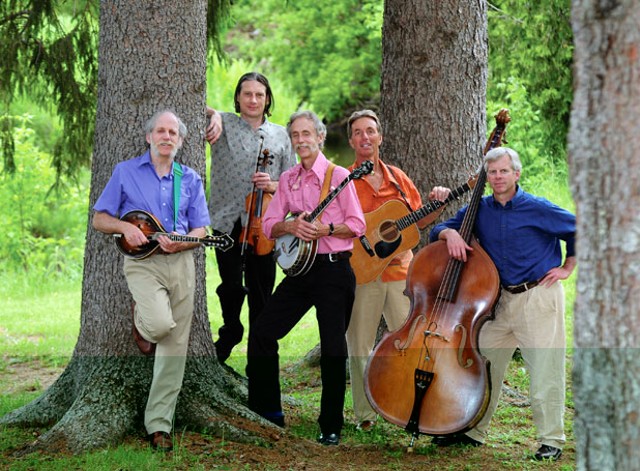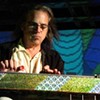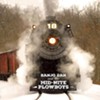Published September 26, 2012 at 9:13 a.m. | Updated October 30, 2020 at 4:56 p.m.
When the labor’s done, I stand and listen to the silence all around.
There’s not a sound
In the setting sun. Only the robin’s song drifting through the trees
On a gentle breeze.
—"I'll Take The Hills by Dan Lindner"
*****
It’s a classically brilliant late summer morning in Montpelier, the kind of day that confuses even longtime Vermonters — not quite T-shirt weather, and not really time for a sweatshirt, either. But it’s chilly in the shade, so Dan Lindner suggests we pull our chairs, where we’ve been sitting for an interview, from the porch into the sun. A panting Lab follows us and Dan’s brother, Willy Lindner, to a brighter spot in the slightly overgrown yard. From this perspective, Dan Lindner’s home looks as welcoming and familiar as a Vermont farmhouse.
Clad in a long-sleeved shirt and a low-slung baseball cap that shades his sharp eyes, Dan Lindner speaks softly but thoughtfully, one hand absentmindedly patting his dog, which sits contentedly at his feet. Lindner gesticulates with his other hand, his long, slender fingers moving with rhythmic ease. It’s hard not to be hypnotized by those hands.
For much of the past 40 years, Lindner’s fingers have curled around the instrument that gave him his moniker: Banjo Dan. The Lindner brothers — Willy is a mandolinist — and Dan’s longtime friend, guitarist Al Davis, form the core of Banjo Dan and the Mid-nite Plowboys. Theirs is the longest-running bluegrass band in Vermont, and quite possibly the longest-running local band in any genre. Many listeners view the Plowboys as the fathers of Vermont bluegrass, certainly as a Green Mountain institution.
But, after four decades, some 17 albums — including those of interconnected side projects such as the Lindners’ duo, the Sky Blue Boys, and “solo” albums that usually include various Plowboys — and innumerable regional gigs at bars, weddings, grange halls and opera houses, Banjo Dan and the Mid-nite Plowboys are calling it a career. The band plays its farewell show at the Barre Opera House this Saturday, September 29.
When Dan, 69, and Willy, 66, talk about the impending conclusion of their very long era, the melancholy is palpable.
“I wouldn’t say I’m happy about the band retiring,” Dan Lindner admits. “But it would appear it’s time.”
Considering the sheer length of the band’s tenure, that’s hard to dispute. The Plowboys have given Vermont audiences more than they could have asked for. And all good things come to an end eventually. Still, even now, the Plowboys seem to be at or near the top of their game, gigging regularly to large, appreciative audiences and writing and recording frequently. The band has a timeless quality (and, perhaps, even an ageless one, despite the gray hair). Few fans would be surprised if they continued to play for years to come. So why stop now?
“Well, we thought 40 was a nice, round number,” explains Dan Lindner, a slight grin almost obscured beneath his signature bushy mustache.
*****
I’ll take the hills, and the valleys full of sunshine
I’ll take the long days working with my hands
I’ll take the fields, and the forest in the moonlight
I’ll take my chances living from the land.
*****
Dan Lindner says he fell in love with Vermont “as one does,” in the early 1970s while visiting his college friend Al Davis, who had moved to the Green Mountains after graduation.
“I just decided to stay,” Lindner adds matter-of-factly.
He began helping Davis build a house in rural Vermont. Willy Lindner, then playing music on the West Coast, soon joined his older brother. When not pounding nails, the trio continued the musical relationship they’d had at school. They shared a love for bluegrass — one that, for the Lindners, went back to their teenage years in Baltimore.
“Eventually we thought, Let’s see if we can take it out and sell this someplace,” says Dan Lindner of the brothers’ early jams with Davis.
In 1972, the trio began playing at a Jeffersonville restaurant called Deer Run, a joint popular with the ski crowd and locals. Those shows soon turned into a weekly Wednesday-night residency that lasted three years and ultimately birthed Banjo Dan and the Mid-nite Plowboys.
It’s remarkable that over their four decades, the Plowboys have had so little turnover. Early in the Deer Run days, the trio approached a local folk singer, Peter Tourin, to play bass. He wasn’t actually a bass player, but he possessed a striking tenor voice. High-range vocals are prized in bluegrass music, so Dan Lindner told Tourin, “If you can learn to play bass, you can be in the band.” Tourin did.
That became a running theme. Later, Sam Blagden, also a fine singer but a banjo player by trade, replaced Tourin. For the past nearly 20 years, tenor Jon Henry Drake has manned the upright. Similarly, the band has occasionally rotated fiddlers and other instrumentalists. Renowned fiddler Phil Bloch, who now lives in Maine, has been a mainstay of the Plowboys’ most recent incarnation; the equally renowned Gene White preceded him.
The Lindners say they’ve been able to play continuously for 40 years because of that versatile cast of characters. When they find themselves missing a piece, they can shift instrumental duties to cover parts. But the real secret of the Plowboys’ longevity may come as a surprise to fans.
“We’ve never taken it too seriously,” says Dan Lindner.
Though the band has at times gigged upward of 60 dates per year, and traveled throughout the Northeast and to Europe and Russia, being Plowboys has never been its members’ sole profession.
“We’ve all always had other things going on, too,” Davis says in a phone interview. Now 69, he’s an entrepreneur and former commissioner of Economic Development for the state of Vermont. Dan Lindner was a piano tuner for many years, as well as an administrator for the Vermont Youth Orchestra. Willy Lindner was a journalist who still freelances.
Davis adds that supportive “friends, girlfriends and wives” have helped keep the band grounded while allowing them the freedom to play regularly.
“I think it’s always been more important to us to be able to enjoy doing it than trying to make a lot of money at it,” Dan Lindner says.
“Which is good, since we haven’t made much,” Willy quips.
*****
There’s an ebb and flow, and a rhythm to the seasons of the year.
My choice is clear
For I’ve come to know, when you work within the natural scheme of things.
What joy it brings.
*****
“I know it sounds outlandish,” he continues. “Not to compare [Dan Lindner] to Bill Monroe, but, in a way, he’s sort of similar. He and Willy and Al were doing it before it was cool again. These guys came and brought legitimacy to what the Vermont bluegrass scene was to be.”
Gordon Stone, 63, is widely considered one of the finest banjo players of his generation, cited alongside modern masters such as Tony Trischka and Béla Fleck. But Stone — also known for his pedal-steel work — credits Banjo Dan and the Mid-nite Plowboys with inspiring him to pursue the banjo. Stone caught a Plowboys show at Deer Run in 1974 after leaving the Berklee College of Music in Boston, where he had been studying jazz guitar.
“I was playing banjo a little and applying some of what I had learned at Berklee,” he says. “Banjo Dan inspired me to really play traditional bluegrass banjo like Earl Scruggs, Don Reno and Ralph Stanley.”
That inspiration led Stone to cofound the progressive bluegrass band Pine Island, a star-studded Burlington group whose members were Plowboys contemporaries during the late ’70s, when bluegrass was exploding locally.
“I remember lines around the corner at Hunt’s when we played,” recalls Willy Lindner, referring to the legendary Queen City nightclub. “And on any given night, there might be four or five bluegrass bands playing in town.”
He says the Plowboys and Pine Island would sometimes swap venues, mid-gig, when they were both playing on the same night. Typically, one band would be at Hunt’s, the other up Main Street at Nectar’s.
“We’d time it so that our sets would finish at the same time,” Willy Lindner explains. “Then we’d race up there, they’d race down here, and we’d play a set for each other’s crowd.”
Reminded of this prank in a phone interview, Stone concurs, “Oh, yeah. That was a lot of fun.”
Another local musician who felt the impact of the Plowboys was Danny Coane, now front man — on vocals and acoustic guitar — for the rockabilly band Starline Rhythm Boys. Another of the area’s most accomplished banjo players, he’s a member of the WDEV Radio Rangers. Coane says what made the Plowboys unique, especially early on, was not simply that they played bluegrass, but that they wrote their own songs and put a personal spin on a genre that can be tightly bound to tradition.
“I’ve always thought their original music was what made the band,” he says in a phone interview, and cites as a personal favorite the Davis-penned “Snowfall,” which was an early Plowboys hit on local radio. “They’re all such great songwriters and really do a nice job of representing Vermont in their music.”
Langdell agrees.
“I wouldn’t call them a traditional bluegrass band,” he says, and explains that part of the band’s appeal is the way the musicians often include elements of other popular styles in the mix. The chorus of “Snowfall,” for example, features harmonies that have more in common with doo-wop than hillbilly music.
“Traditional music can sometimes be less accessible for certain crowds,” Langdell continues. “What Banjo Dan has always done well is find ways to entice those types of listeners with sounds or songs they might recognize, as well as a lot of humor, and still honor the traditions of bluegrass.”
*****
To each his own. Let the great ambitions drive the great men on
From dawn to dawn.
I’ll stay at home, and I’ll just tend my little peaceful plot of earth
For all it’s worth.
*****
In the sleepy Vermont border town of Derby Line, the Haskell Opera House sits directly on the border between the United States and Canada. Technically, most of the stage is in Canada, while the rest of the ornate auditorium, along with the audience, is in the U.S. It’s here, on a recent Friday night, that Banjo Dan and the Mid-nite Plowboys are giving one of their final three performances. Outside, the only evidence suggesting any activity is a small sign bearing the words “Show Tonight!” handwritten in marker, in front of the venue’s entrance.
But inside, a capacity crowd eagerly awaits the band as one might anticipate the arrival of an old friend. The Plowboys have made the Haskell an annual stop for 13 years. Most of the patrons’ hair is as white as the Lindner brothers’ impressive ’staches.
After an introductory song, Davis, the band’s unofficial spokesman — think Garrison Keillor with a wicked streak — informs the audience that the Plowboys intend to deliver “a tasteful ruckus.” That elicits a hearty chuckle and a smattering of applause. Over the next two-plus hours, the quintet obliges with a mix of signature originals and surprising covers — including a version of Norah Jones’ “What Am I to You?” The crowd hangs on every note. Even — or maybe especially — during a blackout of several minutes. The band jams on despite near-total darkness.
Davis, taking lead on several tunes, including “Snowfall,” is playful and smooth, his deep tan a fitting complement to his roguishly suave demeanor. He’s particularly cheeky on his song “Death Comes Down to Danville,” a devilish tale that Charlie Daniels would surely adore.
Bloch is a whirling dervish on fiddle, stepping to the mic with a matador’s grace and confidence. He more than delivers the goods, and his slippery runs elicit some of the evening’s loudest cheers. As good bassists should, Drake holds down the low end with precision and very little flash. That is, until he sings. Whether he’s taking lead or adding high harmony, Drake’s crystalline tenor could make the Louvin Brothers weep.
Willy Lindner, standing to the far left of the quintet’s semicircle, clad in dad-like khakis and a Hawaiian shirt, bustles with frantic energy. He shudders and shakes, holding his mandolin as if it were on fire. Which, in a way, it is.
And then there is Banjo Dan himself, his lean, lanky frame looming in the background, save for the occasions when he rotates toward the solo mic and plucks typically understated, impeccable lines. He smiles occasionally. But generally, Lindner stands there with a genteel stoicism. Or perhaps it’s a tinge of sadness, as he remembers this is one of the last times he’ll stand with the Plowboys onstage.
As they often do, the Plowboys close with a benediction of sorts, a Davis original titled “Good Luck.” In unwavering, multipart harmonies, the band sings, “Good luck to every one of us, as we make our way back home.”
It’s meant as a blessing and thank- you to the audience. But on this night, especially when the crowd spontaneously rises to demand an encore, it’s easy to feel that the song is as much a benediction for the men onstage as it is for those out front.
Banjo Dan and the Mid-nite Plowboys play their farewell concert at the Barre Opera House this Saturday, September 29, at 8 p.m. $18-20. AA. Proceeds benefit the People’s Health and Wellness Clinic in Barre. banjodan.com, barreoperahouse.org
Other Local Bluegrass Pickers
Dan Lindner/Banjo Dan’s retirement leaves a hole in Vermont’s bluegrass scene, but, luckily, a plethora of good players remains to feed your banjo jones. Five-string wizard Gordon Stone is perhaps the best known of them (thanks, Phish!). Here are seven other local banjo pickers well worth checking out. (Disclosure: I am a banjo player and unabashed bluegrass junkie; these selections are totally subjective.)
By day, Steve Light is associate vice president for academic affairs at the State University of New York at Plattsburgh. By night, he plays with two of Vermont’s best bluegrass bands: the mostly instrumental Modern Grass Quintet and the harmony-focused Bluegrass Gospel Project. The Glens Falls, N.Y., native is a two-time Vermont state banjo champion who released a solo album of musical duets last spring titled Banjo and Friends. His next gig is with MGQ on October 13 at Burlington’s North End Studios.
Scott Hopkins is the super-versatile player who replaced Gordon Stone in Breakaway, the erstwhile Burlington-area bluegrass group. He’s also a classically trained tuba player and public school music teacher in New York. Hopkins recently joined Dobro great Junior Barber’s Plattsburgh-based band, Beartracks, and will be showing off his jazzy licks at the Rattling Brook Bluegrass Festival in Belvidere next June.
Starline Rhythm Boys front man Danny Coane is best known for guitar, but his first string instrument was banjo. For almost 20 years, the Montpelier native played the driving five-string heard in the Radio Rangers, the band that re-created old-time bluegrass shows with 15-minute sets that aired Saturday mornings on WDEV and its sister stations. The Rangers ended their radio run this past spring but are still doing occasional live shows, Coane says.
Bill Gaston plays banjo and Dobro with the high-energy traditional band Big Spike. A New Jersey native, Gaston heard his first bluegrass at age 12 while riding in a friend’s Dodge Dart and was hooked. “I threw in a cassette and it was the Osborne Brothers doing ‘Ruby,’ and I was like, holy crap!” Today, Gaston and his wife run the Smugglers’ Notch Inn in Jeffersonville, and he also plays with the Missisquoi River Band. Look for Big Spike at festivals next summer.
Putney native Bruce Stockwell picked up the five-string at age 11 and won Vermont’s state banjo contest at age 14. “There were adult banjo players that were better, but we were so cute in our little matching outfits, all the judges cut us a break,” Stockwell recalls. After stints playing funk and Afro pop, Stockwell returned to his traditional bluegrass roots. The Yale grad married a former student and formed his current two-banjo band, Hot Mustard, with her and another couple. Their next gig is October 6 at the Mole Hill Theater in Alstead, N.H.
Bob Amos was the front man of Front Range, a big-deal Colorado-based band in the 1990s. Today he makes his home in St. Johnsbury, where he runs a recording studio and has swapped guitar for his first instrument, banjo. Amos formed Catamount Crossing and put out an album of original bluegrass songs last spring. He admits he’s a hopeless traditionalist in the mold of Earl Scruggs. “A fellow banjo player once said I play banjo like it’s 1955!” Amos says. Next gig: September 29 at the Second Annual Kingdom Bluegrass Jamboree in St. Johnsbury.
Eric Gibson is half of the acclaimed Plattsburgh-based bluegrass band the Gibson Brothers. He and his brother Leigh have racked up a series of awards for their songwriting and vocal harmonies. The Gibsons do high-and-lonesome better than almost any band around, and Eric’s playing is some of the best traditional picking you’ll hear. Next gig: September 29 at the Plattsburgh Bluegrass Festival.
Speaking of Music, musician Profile
-

Two Local Band Directors March in the Macy's Parade
Nov 22, 2023 -

Before a Burlington Show, the Wood Brothers Get Back to Basics
Oct 26, 2023 -

After a Half-Century of Leading Local Ensembles, Steven and Kathy Light Prepare a Musical Farewell
May 3, 2023 -

Double E 2023 Summer Concert Series Kicks Off With the Wailers
Mar 17, 2023 -

UVM’s New School of the Arts Gathers Many Creative Disciplines Under One Roof
Sep 14, 2022 - More »
Comments
Comments are closed.
From 2014-2020, Seven Days allowed readers to comment on all stories posted on our website. While we've appreciated the suggestions and insights, right now Seven Days is prioritizing our core mission — producing high-quality, responsible local journalism — over moderating online debates between readers.
To criticize, correct or praise our reporting, please send us a letter to the editor or send us a tip. We’ll check it out and report the results.
Online comments may return when we have better tech tools for managing them. Thanks for reading.





















































